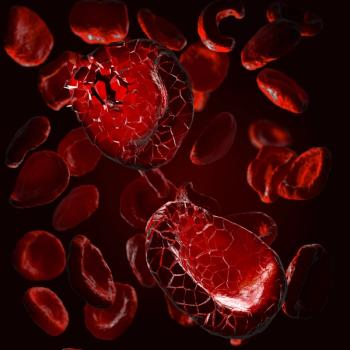
Data for ciltacabtagene autoleucel from CARTITUDE-1 show that use in the setting of heavily pretreated multiple myeloma bests standard-of-care treatments.

Your AI-Trained Oncology Knowledge Connection!


Data for ciltacabtagene autoleucel from CARTITUDE-1 show that use in the setting of heavily pretreated multiple myeloma bests standard-of-care treatments.

Treatment with lisocabtagene maraleucel resulted in long-lasting responses in patients with relapsed/refractory large B-cell lymphomas.

A study presented at 2021 ASH found that costs and time spent managing adverse effects varied significantly in patients with chronic lymphocytic leukemia who were being treated with acalabrutinib, ibrutinib, and venetoclax.

Treatment with naratuximab emtansine and rituximab appeared to be well-tolerated with efficacious responses in a population of patients with B-cell non-Hodgkin lymphomas who were ineligible for stem cell transplant or CAR-T cell therapy.

Tolerable safety and durable remissions seen with ublituximab and umbralisib plus ibrutinib for patients with chronic lymphocytic leukemia who had detectable minimal residual disease after previous ibrutinib therapy.

The ZUMA-7 trial demonstrated an event-free survival improvement in patients with relapsed or refractory large B-cell lymphoma treated with axicabtagene ciloleucel.

Improvement in major molecular response rate and depth of response coupled with a favorable safety profile were noted with asciminib vs bosutinib in patients with chronic-phase chronic myeloid leukemia.

Patients with relapsed or refractory follicular lymphoma or marginal zone lymphoma had high rates of response and overall survival with axicabtagene ciloleucel at an updated analysis of the ZUMA-5 trial.

Thomas G. Martin, MD, spoke about the updated results of the CARTITUDE-1 study examining ciltacabtagene autoleucel in relapsed or refractory multiple myeloma.

Induction and consolidation with daratumumab, ixazomib, lenalidomide, and dexamethasone was able to induce minimal residual disease in a subset of patients with transplant-eligible newly diagnosed multiple myeloma and standard-risk disease.

Preclinical data show promise for the novel non-covalent Bruton tyrosine kinase inhibitor pirtobrutinib in mantle cell lymphoma with resistance to both ibrutinib and venetoclax.

Among patients with newly diagnosed multiple myeloma, 80% of a study cohort reached MRD negativity following treatment with daratumumab, carfilzomib, lenalidomide, and dexamethasone.

A quality-of-life analysis from the phase 3 ZUMA-7 trial of axicabtagene ciloleucel in patients with relapsed or refractory large B-cell lymphoma shows favorability of the CAR T-cell therapy over standard options.

After 3 years of follow-up in the ASCEND study, progression-free survival continues to favor acalabrutinib vs investigator’s choice of therapy for relapsed chronic lymphocytic leukemia.

Treatment with the CAR T-cell therapy tisagenlecleucel for relapsed or refractory diffuse large B-cell lymphoma or high-grade B-cell lymphoma was favorable in both the pivotal clinical trial and the real-world setting, according to new data made available during 2021 ASH.

Patients with chronic lymphocytic leukemia experienced improved quality of life after being treated with continuous ibrutinib and rituximab, as well as frontline fludarabine, cyclophosphamide, and rituximab.

Weekly selinexor combined with bortezomib and dexamethasone appears to be a promising option in patients with high-risk multiple myeloma.

The infusion of E-Coli- and Erwinia-derived asparaginase therapies combined with chemotherapy appeared to be well tolerated with biological efficacy in patients with acute lymphoblastic leukemia under the age of 55, providing an additional option for patients for whom further asparagine treatment is contraindicated due to toxicity.

A population of patients with relapsed/refractory multiple myeloma appeared to benefit from treatment with selinexor plus daratumumab, bortezomib, and dexamethasone

A population of patients with relapsed/refractory B-cell acute lymphoblastic leukemia appeared to have comparable real-world benefit from tisagenlecleucel compared with findings from the phase 2 ELIANA trial.

Data presented at 2021 ASH indicate that 2-year progression-free survival rates were improved when ibrutinib was added to rituximab plus mini-CHOP in an elderly cohort of patients with previously untreated diffuse large B-cell lymphoma.

Sattva S. Neelapu, MD, spoke about the ZUMA-5 trial and the long-term follow-up results seen with axicabtagene ciloleucel in patients with relapsed or refractory indolent non-Hodgkin lymphoma.

Depression and anxiety notably impact how patients with hematologic malignancies view clinical studies.

In a population of patients with chronic myeloid leukemia with resistant disease experienced promising activity following treatment with ponatinib regardless of T315I mutation status.

Investigators noted that patients with acute myeloid leukemia, acute lymphoblastic leukemia, and myelodysplastic syndrome who were diagnosed with COVID-19 were more likely to experience COVID-19 mortality vs non-cancer patients.

Patients with autologous stem cell transplant–ineligible relapsed/refractory diffuse large B-cell lymphoma appear to benefit from treatment with tafasitamab and lenalidomide.

Adding isatuximab to lenalidomide, bortezomib, and dexamethasone demonstrated a superior minimal residual disease rate in patients with transplant-eligible newly diagnosed multiple myeloma.

A strong antibody response was seen in patients with acute myeloid leukemia and myelodysplastic syndrome who received the mRNA COVID-19 vaccine.

Patients with relapsed or refractory follicular lymphoma who had been given 2 or more prior lines of therapy and received tisagenlecleucel saw positive efficacy responses.

Jennifer A. Woyach, MD, spoke about the phase 3 AO41202 study, which investigated different ibrutinib regimens for elderly patients with chronic lymphocytic leukemia.